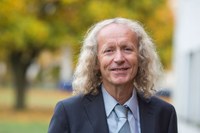Keynote Lecture "Extending Futurability through the Imagination: Affordances and Constraints of Factual and Fictional Narratives as Cultural Ways of Making Futures”
Prof. Dr. Dr. h.c. Ansgar Nünning at 10:45 on Monday, June 19
Keynote Lecture I "Extending Futurability through the Imagination: Affordances and Constraints of Factual and Fictional Narratives as Cultural Ways of Making Futures" with Prof. Dr. Dr. h.c. Ansgar Nünning at 10:45 on Monday, June 19.
As the subtitle indicates, the lecture will argue that factual and fictional narratives have been, and continue to be, among the most powerful cultural ways of making futures, playing a crucial role in prevalent “ways of worldmaking”, to use the felicitous term coined by the philosopher Nelson Goodman. The performative force of factual and fictional narratives results from their power to construct present and future world-models. The lecture will analyse both the processes involved in the making of futures through storytelling, and the respective affordances and constraints of factual and fictional narratives.
Taking its cue from the basic procedures for constructing worlds identified by Goodman, the lecture pursues three main aims: First, it attempts to explore the formal choices, narrative patterns, and cultural ways in which factual and fictional narratives have been involved in the genesis or production of futures. Secondly, it will offer modest reflections on the affordances and constraints of factual and fictional narratives as cultural ways of making futures. Thirdly the lecture will try to gauge whether factual and fictional narratives serve to curtail the horizon of possibility or rather enhance futurability. By doing so, I hope to be able to shed some light on the ways in which futurability can be extended through the imagination and to explore transformations in the study of culture through “Imagineering” (Metelmann/Welzer 2020) and mindfulness.
Using various examples ranging from the so-called ‘war on terror’ based on alleged ‘weapons of mass destruction’ to the pseudo-facts used as a legitimisation of Brexit , I will try to show that (pseudo)factual narratives can turn even “convenient untruths” (Al Gore) and “bullshit” (Harry G., Frankfurt) into widely accepted (pseudo-)facts which have an enormous impact on making futures, while many ‘inconvenient truths’ are either not acknowledged as ‘facts’ or go largely unnoticed. In contrast to pseudo-factual political narratives, speculative fiction and other fictional narratives arguably serve as cultural media generating possible (future) worlds, while also enhancing futurability, “imagineering” and our ability to “Imagine the Unimaginable” (McGonigal 2022: 237).
 |
Ansgar Nünning has been a Professor of English and American Literature and Cultural Studies at the University of Giessen since 1996. He is the founding director of the Giessen Graduate School for the Humanities and of the International Graduate Centre for the Study of Culture (GCSC) as well as the academic director of the International PhD Program (IPP) “Literary and Cultural Studies.” He has published widely on English and American literature, cultures of memory, narratology, and literary and cultural theory. His recent publications include Cultural Ways of Worldmaking: Media and Narratives (with Vera Nünning and Birgit Neumann, 2010) and The Value of Literature (with Vera Nünning in REAL - Yearbook of Research in Englisch and American Literature 36, 2021).
|
